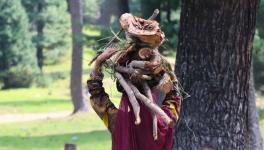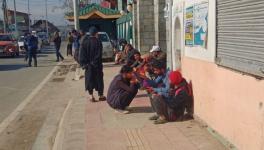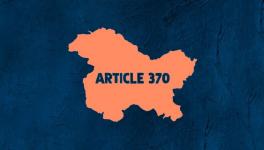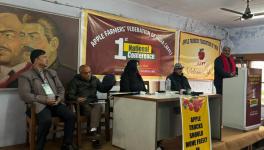Kashmir: For Tribal Women, Winter is All About ‘Wood, Water, Worries’
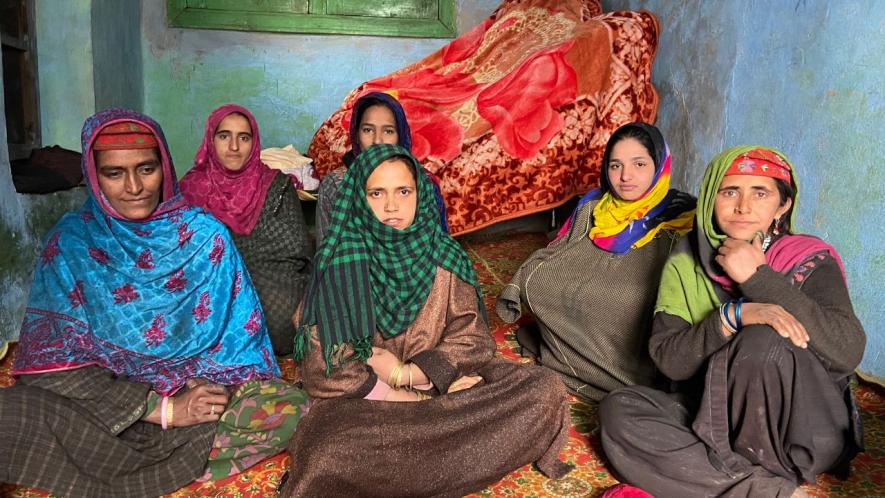
Tral, Kashmir: In freezing winters, Phula Jan sits near the traditional mud stove, locally known as chulla, blowing into it to light up the wood and prepare dinner for her family. Her kids, sitting beside her, wait patiently for supper to get ready and keep close to the chulla to stay warm. Firewood is the only source of warmth available to the family during the harsh winters.
Life is tough for tribal women living in the far-flung villages of Kashmir and winters only bring in more challenges, especially when menfolk refuse to help in any way and, according to the women here, sit lazily in the house draped in thick blankets sipping tea all day long, while women walk the difficult, slippery and rough paths to arrange for firewood and drinking water for the family.
Jan lives in the village of Gundtal Doodhmarg in the district of Pulwama, 54 kilometers from the capital city of Srinagar. The village is located on a hilltop with a narrow, zigzag road and several narrow pathways, one of them leading to Jan’s house. She lives here with her husband and two kids aged four and two. Jan’s husband is a labourer.
“The winter months are tough, with nearly six feet of snow and temperatures dropping to minus 12 degrees. Our workload includes arranging firewood for cooking and keeping ourselves warm. It is even more daunting given that the men hardly help, feeling that they have done their duty by making arrangements and stocking food during the summer,” says Jan, mentioning that in addition to the household chores, she also has to take care of her kids.
Winters in this Himalayan region of Kashmir begin in late November and continue till March, when the days start getting slightly warm. There is a 40-day harsh period, locally known as ‘Chillai-e-Kalan, during which temperatures drop drastically. For the people living in the mountain regions of Kashmir, the winter months are extremely harsh, especially for the women, who have to bear the burden of household as well as outside work.
“My day starts with arranging firewood for the chulla from the nearby forest. I walk with the women in my community for at least two hours in the snow to get firewood, which is our fuel for cooking as well as to keep ourselves warm,” Jan explains.
According to the 2011 Census, the Gujjar and Bakarwal tribal communities represent the third largest ethnic group in Jammu and Kashmir, constituting more than 11.9% of the total population of the state.
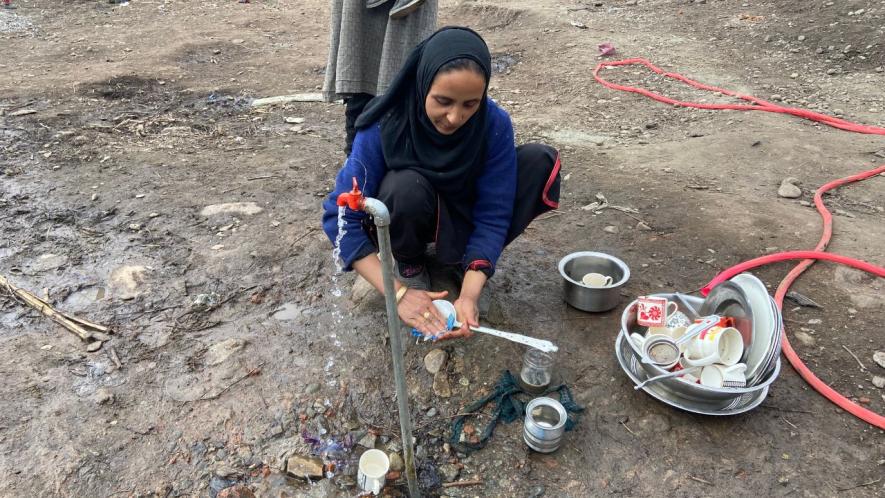
Women in these communities often have limited decision-making powers in the households. As per a research study titled ‘Autonomy and Decision-making Ability among Gujjar Women of Kashmir’ “the role of the women in decision-making is restricted to making decisions related to minor domestic matters with men independently making significant decisions.”
A deeper look by the research reveals that a vast majority of women report being denied equal opportunities to voice their opinions or contribute to important decisions, with many asserting that men often make choices independently.
The research emphasises the crucial role of Gujjar women as essential contributors both at home and in the workforce. However, it points out that their empowerment in asserting themselves during decision-making remains alarmingly low.
"The authoritarian male-dominated nature of the family necessarily invests decision-making powers in the male members," the study concludes, highlighting the systemic barriers that hinder women's voices from being heard in their communities.
Another study by the University of Jammu indicates that Gujjar and Bakerwal women are not aware of their rights and schemes launched by the government for their education, health, and social uplift as they live in far-flung and difficult areas and are nomads. Living in faraway places in remote areas, they hardly get any information regarding such schemes.
Echoing Jan’s sentiments, Mansha Jan, another woman from the community describes the innumerable challenges women face during winter.
“Women in our communities have to be exceptional to endure these winter months. I rarely get any help from my husband and most of the time he just passes orders. Finding firewood in the forests, cooking, and caring for kids and cattle is overwhelming. But we have no choice; we must walk through frozen, slippery paths to fetch water, sometimes twice a day,” she says.
For the women, the tasks are relentless and exhausting keeping them busy all day.
“The winters here get harsher each year and weather patterns are also changing. If we do not gather firewood, our families will starve. The men rarely do any work in winter. We get stuck in our homes. Even getting essentials like groceries from the markets is difficult because we have to walk for several kilometers. Sometimes we store essentials for winters, but we run out of them most of the time,” she says.
Hashima Begum, an elderly woman and a mother of eight, remarks on the irony of enjoying the first snowfall. “For us, it’s also a warning that hard days lie ahead.”
Another woman, Shareefa Jan, stresses the issue of electricity during winter, apart from the lack of basic amenities—including firewood, and water, and the indifference from men— that add to their difficulties.
According to the 2020 Economic Survey of Jammu and Kashmir, more than 42% of the population of Scheduled Tribes, of which the majority are Gujjars and Bakarwals, lived below the poverty line. Many in the village struggle continue to live in dire conditions.
Unequal Distribution of Work
In tribal communities, men typically do not help with household chores, leaving the burden entirely on women.
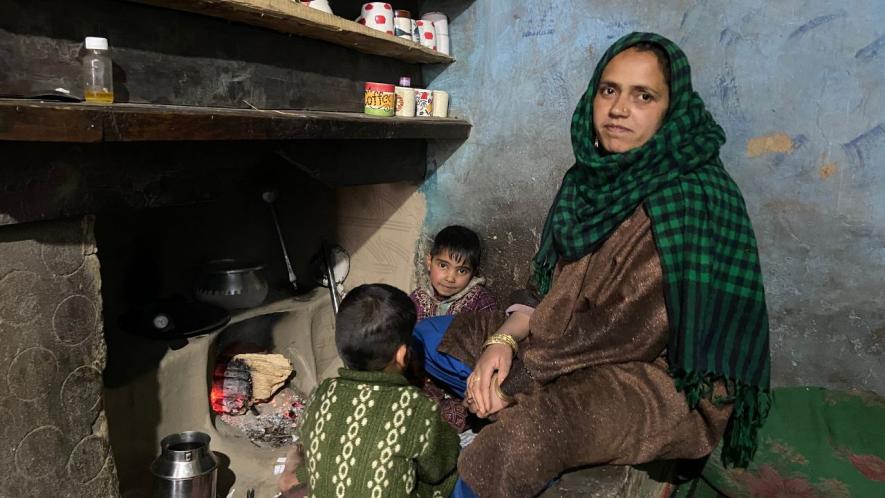
"We work and earn for the family. Women working at home is an age-old tradition here and we can't do that work. Sometimes I do help in some outside world like cutting firewood. But helping with kitchen chores isn’t for me,” says Shabir Khatana, adding that “as men, our main job is to provide livelihood to our family.”
While women complain that men rarely go out to work in the winter months and sit at home idle, Khatana claims winter months significantly reduce labour opportunities, forcing men to remain at home.
“I work as a labourer and getting a job in winter is sometimes difficult. What can I do about that?” he says.
Javaid Rahi, a tribal activist, whose work focuses on research and advocacy for tribal societies in Kashmir, explaining the unique dynamics of work and gender roles within tribal communities, specifically among the Gujjars, said, “In tribal society, there is a concept of equality. However, this equality manifests in distinct roles: men prioritise their work while women manage household responsibilities. For example, a woman's role encompasses household chores, fetching water, and washing clothes, which they view as their responsibility.”
Rahi says distribution of labour is essential for the functioning of these communities: “The man’s job is to earn and engage in agricultural work. Society depends on this division of labour, and since it is not an urbanised society, men and women do not typically interfere with each other’s domains.”
He adds, “The tribal society has been traditionally shaped in this manner, with defined roles existing in an equal context for decades. There is no pressure on women; they embrace their tasks as responsibilities.”
In these communities, agricultural work and access to grazing land are of utmost priority, followed by the availability of water.
“In many tribal villages, the distribution of water is not as organised as in more urban areas, leading to significant challenges. Tribal people often live in remote areas, which means that government schemes frequently do not reach them. Water access is a critical issue, particularly during winter months,” Rahi says.
Winter exacerbates the burden on women, as many men leave their homes in search of work in warmer locations.
“During this time, women are left to shoulder the entire load of domestic responsibilities, facing increased pressures in the absence of their male counterparts. The health of women in the tribal regions is not prioritised; they rarely focus on their health and well-being,” Rahi says.
The Days Don’t End for Women
For tribal women, the day does not end.
"We have to walk four to five km into the to collect firewood. After we collect the wood, we bind it carry it back on our heads. The wood is heavier in winter due to water absorption, and can be anything between 10-15," says Gulzara Akhtar.
"I feel that we keep working throughout the day. I get up early in the morning to prepare breakfast for everyone while getting the kangri—earthen pots filled with coal to provide warmth during the winter—ready for my family. After serving breakfast, I head out to fetch water,” she says.
Akhtar's experiences highlight the demanding routines women face in these communities, illustrating their integral roles in sustaining households and coping with the adverse effects of weather conditions.
Asked if men could help the women in any household work, Aisha giggles.
"We have never seen them do any household work. If they could help, I would at least get to rest for some time. I love to knit and would love to do that in my free time," she adds.
The writer is an independent journalist. This story is supported by a grant from the Pulitzer Centre for Crisis Reporting.
Get the latest reports & analysis with people's perspective on Protests, movements & deep analytical videos, discussions of the current affairs in your Telegram app. Subscribe to NewsClick's Telegram channel & get Real-Time updates on stories, as they get published on our website.









